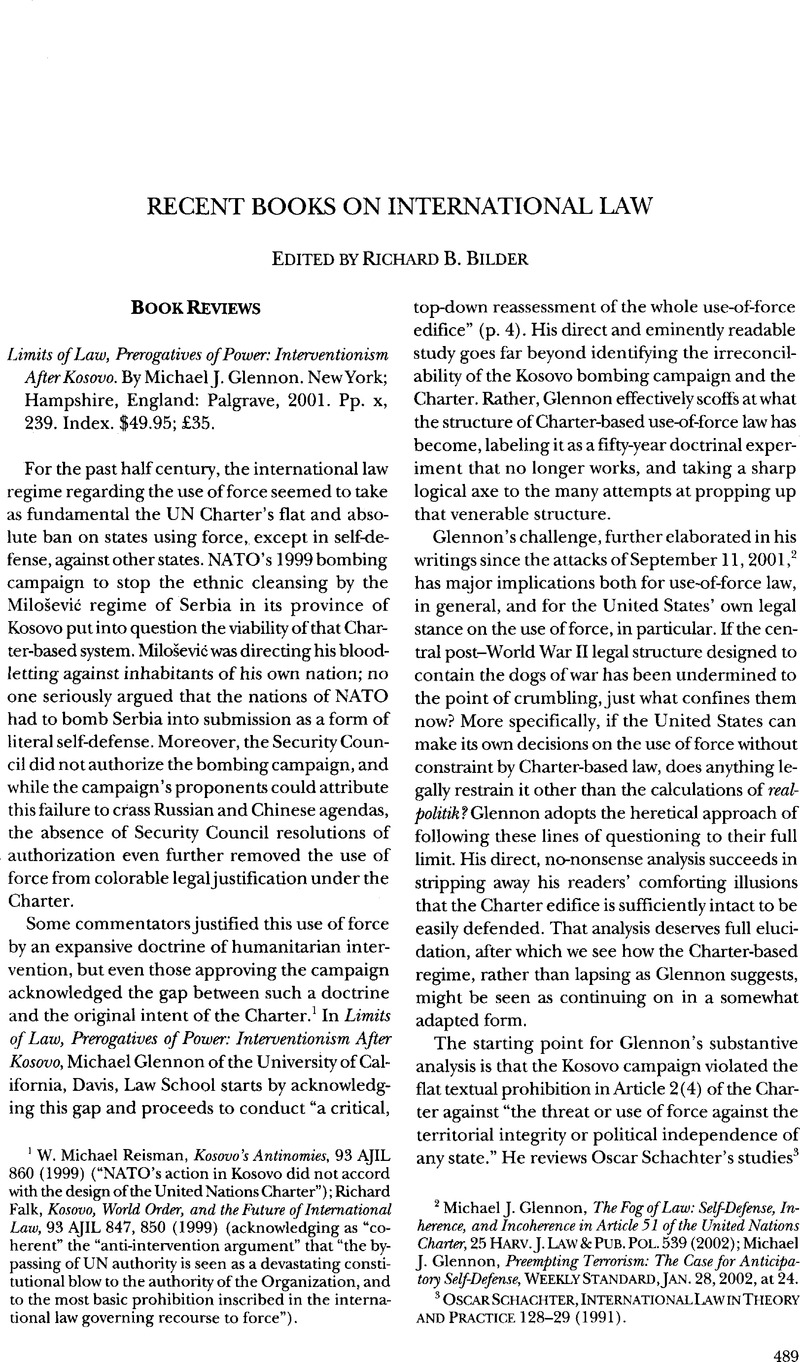No CrossRef data available.
Published online by Cambridge University Press: 27 February 2017

1 W. Reisman, Michael, Kosovo’s Antinomies, 93 AJIL 860 (1999)Google Scholar (“NATO’s action in Kosovo did not accord with the design of the United Nations Charter”); Falk, Richard, Kosovo, World Order, and the Future of International Law, 93 AJIL 847, 850 (1999)Google Scholar (acknowledging as “coherent” the “anti-intervention argument” that “the bypassing of UN authority is seen as a devastating constitutional blow to the authority of the Organization, and to the most basic prohibition inscribed in the international law governing recourse to force”).
2 J, Michael. Glennon, , The Fog of Law: Self Defense, Inherence, and Incoherence in Article 51 of the United Nations Charter, 25 Harv. J. Law & Pub. Pol. 539 (2002)Google Scholar; J, Michael. Glennon, , Preempting Terrorism: The Case for Anticipatory Self-Defense, Weekly Standard, Jan. 28, 2002 Google Scholar, at 24.
3 Schachter, Oscar, International Law in Theory and Practice 128–29 (1991)Google Scholar.
4 “[T]he United States is not amiss in claiming some measure of legitimacy from Security Council resolutions . . . .” Ruth M. Wedgwood, Nato’s Campaign in Yugoslavia, 93 AJIL 828, 829 (1999).
5 See also D, Sean. Murphy, , Humanitarian Intervention: The United Nations in an Evolving World Order (1996)Google Scholar.
6 See, e.g., Henkin, Louis, How Nations Behave: Law and Foreign Policy (2d ed. 1979)Google Scholar; M, Thomas. Franck, , Lessons of Kosovo, 93 AJIL 857, 859 (1999)Google Scholar (commenting on J, Michael. Glennon, , The New Interventionism: The Search for a Just International Law, Foreign Aff., May/ June 1999 Google Scholar, at 2).
7 Various scholars have presented strong arguments that the contemporary meaning of “domestic jurisdiction” must and should reflect the evolution of international law since the time of the Charter. While Glennon respects these arguments, he argues against them on several levels, ranging from an adamantine emphasis on original intent to the unsoundness of an evolving interpretation of the Charter on this particular matter. “The limits explicitly imposed by Article 2(7) . . . constitute express proscriptions. To argue for power to override express proscriptions is, in a very real way, to argue against the rule of law” (p. 128).
8 See supra sources cited note
9 Brownlie, Ian, International Law and the Use of Force By States 250 (1963)Google Scholar.
10 Dinstein, Yoram, War, Aggression And Self-Defense 93 (2ded. 1994)Google Scholar.
11 See, e.g., Gray, Christine, International Law and The Use of Force (2000)Google Scholar.
12 See e.g., Quigley, John, The United Nations Security Council: Promethean Protector or Helpless Hostage? 35 Tex. Int’l L. J. 129 (2000)Google Scholar; D, Sean. Murphy, , The Security Council, Legitimacy, and the Concept of Collective Security After the Cold War, 32 Colum J. Transnat’l L. 201 (1994)Google Scholar. Events and politics of the last decade (as with the 1994 Somalia intervention) have reduced the legitimacy accorded domestically in the United States to the use of force having only Security Council approval, but have increased such legitimacy when NATO has also given its approval. Tiefer, Charles, Adjusting Sovereignty: Contemporary Congressional-Executive Controversies About International Organizations, 35 Tex. Int’l L. J. 239, 254–57 (2000)Google Scholar; Tiefer, Charles, War Decisions in the Late 1990s by Partial Congressional Declaration, 36 San Diego L. Rev. 1, 14–15(1999)Google Scholar.
13 Other commentators who have recently pursued a similar line of analysis include, in these pages, Jonathan Charney in his 1999 editorial on the Kosovo intervention. See I, Jonathan. Charney, , NATO’s Kosovo Intervention: Anticipatory Humanitarian Intervention in Kosovo, 93 AJIL 834, 838–39 (1999)Google Scholar.